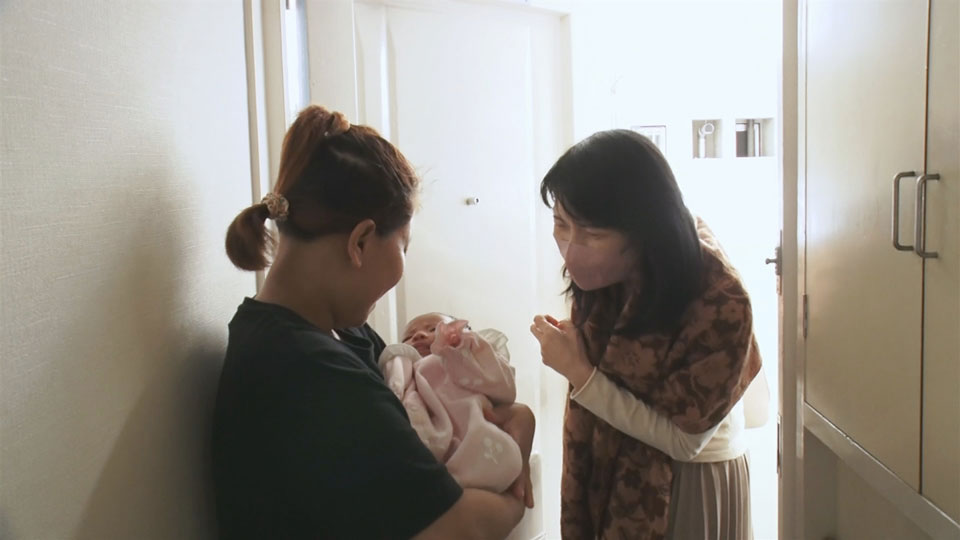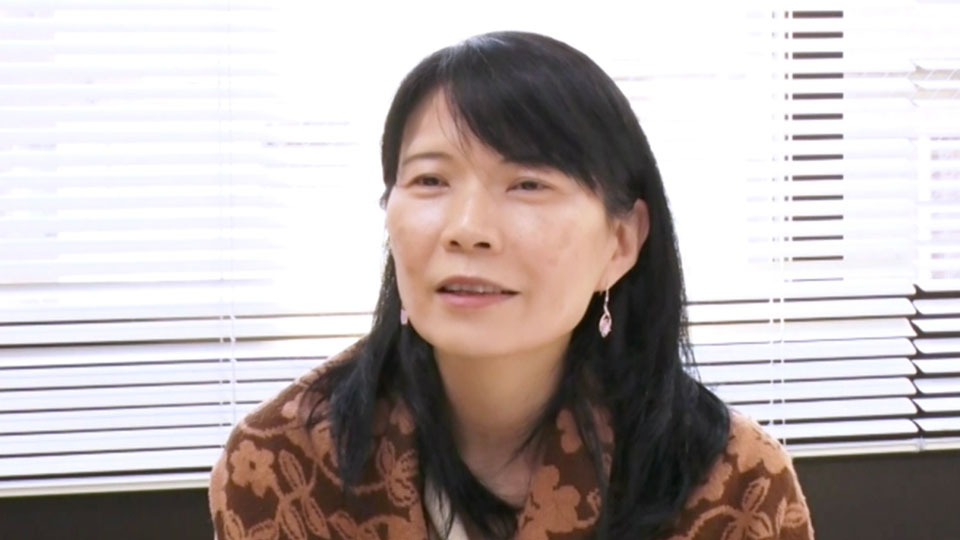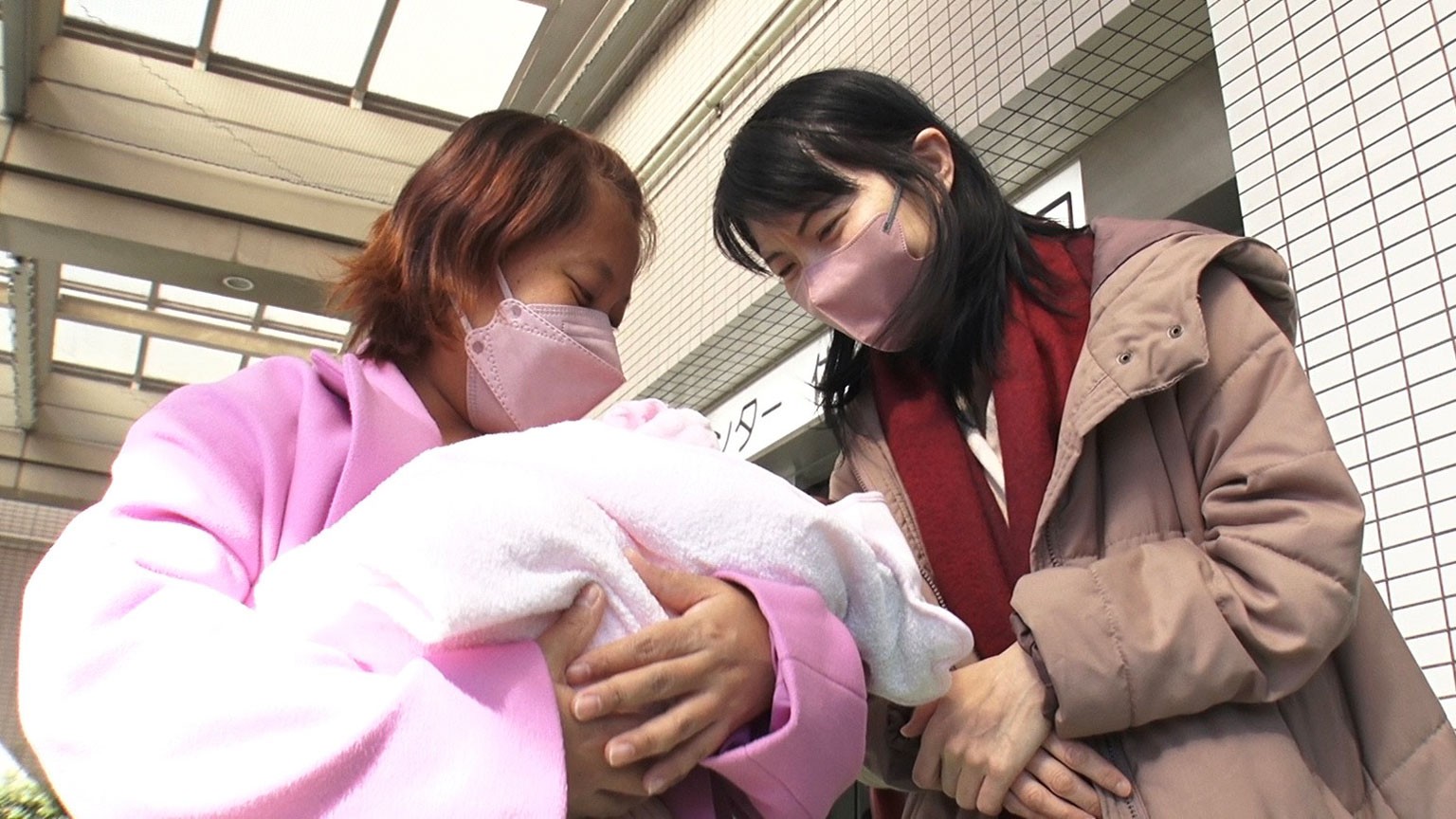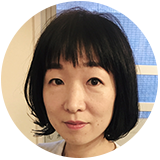New mother's challenge
Ei Thandar Soe and her husband gave birth to a baby girl in Japan in February of 2023, about seven years after coming to the country from Myanmar as technical intern trainees. Becoming new parents has been difficult. Ei Thandar Soe's husband lives an hour and a half away by train due to his job, so she usually has to take care of their infant daughter without him.

Navigating the red tape of motherhood in Japan has been more complicated than it is back in her home country. Ei Thandar Soe says new parents in Myanmar only have to deal with one document. In Japan, she has received a slew of paperwork, from general parenting guides to newborn vaccination information. It has been difficult for her to recognize which documents are the most important.

Helping hand
That's why she has been grateful to have the help of Tsubonoya Tomomi, who leads a non-profit organization supporting foreign mothers. From helping with paperwork to accompanying her during doctor's appointments, Tomomi has been there to support Ei Thandar Soe before and after delivery.

Tomomi says she was motivated to help foreign mothers because of her experiences growing up in Hong Kong and the UK. She says she'll never forget how her mother, who couldn't speak English, struggled to raise her and her older sister.
Tomomi went on to work at a nursery school in Japan, where she witnessed firsthand the lack of support for foreign mothers struggling with Japanese. Non-Japanese mothers sometimes get passed around from one hospital to another due to language barriers and a lack of translation services. Some staff even treat religious considerations as coming from a place of selfishness.

Support with multiple languages
Tomomi says she felt she had to do something to help them, and in 2020 she founded the NPO called Mother's Tree Japan. It is now forty members strong, with specialists like nursery school teachers, midwives, and medical interpreters offering assistance in 12 languages. They have helped more than 1,500 mothers so far.

"Mothers living in a country that's not their own can feel extra anxiety," says Tomomi. "We try to be by their side and encourage them to speak freely about their worries. I believe making them feel accepted along with their culture is more important than language."
One of the fruits of the group's work has been a series of communication boards for mothers and mothers-to-be. One is designed to help them communicate issues that may be too embarrassing or difficult to describe with limited Japanese. Mothers can simply point to an image corresponding to their problem, such as if their water breaks or they feel physical pain.

The boards were developed together with volunteer staff who experienced giving birth abroad, as well as foreign mothers living in Japan. They're freely available for download from the Mother's Tree website. Some hospitals, clinics, and local governments have even begun using them.
Another challenge for foreign moms is finding access to useful information and tools. Japan provides multilingual guides and other resources, but knowing where to get them can be difficult. Some families may face barriers to downloading and printing the information. To address this, Mother's Tree compiles, prints, and delivers the materials to mothers. Tomomi says she wants moms with limited Japanese to have just as much support and information as those who are fluent.

Beneficial also to Japanese mothers
Some have questioned whether the group should be putting more resources into helping foreign mothers first, saying that Japanese moms are also having a hard time. But Tomomi believes that building support networks for foreign mothers will benefit Japanese mothers, too.
To facilitate these shared benefits, Tomomi has organized regular meetings where mothers from different countries can exchange perspectives on parenting and learn new ideas from other cultures.
Foreign mothers often feel they must follow the strict guidelines or established parenting styles laid out in Japanese parenting books. They worry that if their child or parenting style deviates even slightly from these standards, then it means they're not doing it right.
Japanese moms like Muramatsu Megumi say the gatherings have been a valuable opportunity for them as well. She has three kids, ranging in age from one to seven. Megumi says she has felt that the Japanese model of motherhood, often reinforced through strict parenting guidebooks, was a burden on her. She says feelings of uncertainty over whether she was being a "good mom" were only worsened by traditional support groups.

"In Japanese-only groups, I end up comparing myself to others ... and wonder if I'm doing it right," says Megumi. "But here, I don't need to worry so much. I can look at childrearing in a freer, more open way."
Megumi says she felt relieved and less judged after taking part in an exchange meeting hosted by Tomomi. She could hear in a casual environment about parenting philosophies from moms who had come to Japan from countries including Myanmar, Vietnam, and France.
Tomomi says Japanese people often think bridging cultural gaps is only useful to help foreigners adapt to Japan. But she says it's a two-way street, offering them a valuable way to find new points of view from other cultures. She hopes Mother's Tree Japan can help make raising the next generation easier for people from all walks of life.


